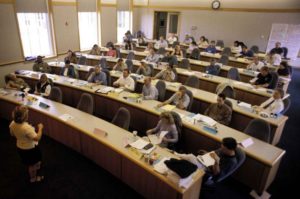“She kept dropping F-bombs throughout her talk.”
My text notification chirped. She was writing from a classroom lecture.
“I’m in a world language course. In our random reading this week we read the story of Adam and Eve. The professor told the class it was a myth that teaches women are useless, scapegoats for world evil. This is not the first time our language studies prof has denigrated Christianity and the Bible. In a class that is supposed to be teaching me a world language we just spent an hour discussing the inappropriateness of the Bible’s sexism.”
My response included the obvious question “Is this a Spanish class or a theology class?”
 I sent my young protégé a link to my teaching (here) attacking the “Genesis as myth” claim.
I sent my young protégé a link to my teaching (here) attacking the “Genesis as myth” claim.
The text exchange left me wondering how often other professors speak outside the framework of course objectives, turning Spanish class into an attack on Christianity.
As it turns out, I didn’t have to wait long to find out.
Depending on your point of view, “multiculturalism” can be welcoming or hostile.
In one class, “hostile” would be the proper definition.
The student sat across from me at the lunch table. “I was just attacked in my class for being a white Christian dominating other cultures.”
The young woman told us at the lunch table, “She kept dropping F-bombs throughout her presentation. It was pretty obvious she was trying to intimidate the class. Her eyes locked on each individual around the room. Her angry gaze was meant to demean, humiliate, making students submit to her way of thinking.”
This kind of rhetoric and abuse from speakers on college campuses is not new (examples here).
“Imagine a Muslim student being asked to tolerate this kind of abusive rhetoric,” I replied.
She shook her head up and down. “What really got me, though, was her conclusion. ‘Go be who you are’ was her final admonition. It totally contradicted everything she had just said!”
Indeed.
Episode #3
Students do a lot of reading in college, as well they should.
But sometimes the reading can challenge basic beliefs that Christian students hold.
Just last week I spent a couple of hours with a young man helping him with an article he had to read for class. The essay was positing that the Christian understanding of humans being sinful, corrupt in our thinking, is outdated and wrong. In fact, the prof intoned that students needed a more “up-to-date, educated reality of peoples’ diverse motivations.” The emphasis of the class was to suggest that human beings are basically good that we should, and I quote what the student heard in class, “be set free to follow our own secular ways.” The professor went on to say that the Christian viewpoint just wanted to control people, calling this “a religious stigma.” Of course, the professor said nothing about his own “control” which was actually “stigmatizing” students’ Christian beliefs!
 My young friend and I had a rousing discussion which, I understand, turned into quite a rousing discussion in the class after our talk.
My young friend and I had a rousing discussion which, I understand, turned into quite a rousing discussion in the class after our talk.
I LOVE talking with Christian young people at college about their studies and what they are hearing in the classroom. If you know of a Christian college student in Indianapolis who could benefit from these kinds of discussions, let me know. MORE “Campus Episodes” next week!
 Dr. Mark Eckel is President of The Comenius Institute (website), spends time with Christian young people in public university (1 minute video), hosts a weekly radio program with diverse groups of guests (1 minute video), interprets culture from a Christian vantage point (1 minute video), and teaches weekly at his church (video).
Dr. Mark Eckel is President of The Comenius Institute (website), spends time with Christian young people in public university (1 minute video), hosts a weekly radio program with diverse groups of guests (1 minute video), interprets culture from a Christian vantage point (1 minute video), and teaches weekly at his church (video).
Picture credit: snappygoat.com, www.easyfreeclipart.com




